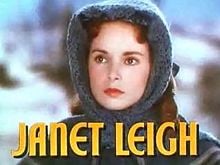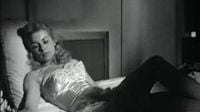Leigh, Janet
Mihir Shah (talk | contribs) |
Mihir Shah (talk | contribs) |
||
| Line 39: | Line 39: | ||
==='''Manchurian Candidate'''=== | ==='''Manchurian Candidate'''=== | ||
| + | At this point in [[Janet Leigh]]'s career, she was on the decline; however, the [[Machurian Candidate]] once again revived her career and appeal to the public. It is most intriguing that Leigh's most successful films corresponded with a dark theme pertaining to the psyche. In this film, [[Janet Leigh]] plays the role of [[Eugenie Rose Chaney]] or simply Rosie, a government agent. It shares many features with Leigh's [[Psycho]]. In fact, "The mood of this pseudo-documentary, satirical film masterpiece (from prolific veteran television director Frankenheimer) is paranoic, surrealistic, dark, macabre, cynical, and foreboding - these elements are combined in a traditional, top-notch suspenseful thriller framework with a nail-biting, Alfred Hitchcock-like climax." <ref>[http://www.filmsite.org/manc.html Manchurian Candidate] Retrieved August 31, 2008</ref> | ||
===Twilight of the Goddess=== | ===Twilight of the Goddess=== | ||
Revision as of 06:42, 1 September 2008
| Janet Leigh | |
 from the trailer for Little Women (1949) | |
| Birth name: | Jeanette Helen Morrison |
|---|---|
| Date of birth: | July 6 1927 |
| Date of death: | October 3 2004 (aged 77) |
| Death location: | Los Angeles, California |
| Spouse: | John Carlisle (1942–1942) (annulled) Stanley Reames (1946–1948) (divorced) Tony Curtis (1951–1962) (divorced) Robert Brandt (1962–2004) (her death) |
Janet Leigh (born Jeanette Helen Morrison; July 6, 1927 – October 3, 2004) was an American actress. Her most famous role was in Alfred Hitchcock's classic Psycho, for which she received a Golden Globe and was nominated for an Academy Award. Leigh also starred in many other films during her career, and is in the top 100 best actresses of the century; however, as it was with co-star Anthony Perkins, Janet Leigh will perhaps be known for her role in Psycho, particularly the harrowing shower scene.
Biography
Early life
Leigh was born in Merced, California as the only child of Helen Lita (née Westergard) and Frederick Robert Morrison. She was discovered by actress Norma Shearer, whose late husband Irving Thalberg had been a senior executive at Metro-Goldwyn-Mayer. Shearer showed talent agent Lew Wasserman the photograph she had seen of Leigh while vacationing at the ski resort where the girl's parents worked. She left the University of the Pacific, where she was studying music and psychology, after Wasserman secured a contract with MGM.
Career
Leigh made her film debut in The Romance of Rosy Ridge in 1947, as the romantic interest of Van Johnson's character. Throughout the 1950s, she starred in movies, most notably in the leading role in the musical comedy My Sister Eileen, co-starring Jack Lemmon, Betty Garrett and Dick York.
Revolutionary Films
Janet Leigh's top-heavy acting career sparked a revolution in cinematic history. The three Leigh films that helped shaped modern cinema, which often find their way onto the top movies of the twentieth century, are Touch of Evil, the legendary Psycho, and Manchurian Candidate.
Touch of Evil (1958)
Touch of Evil
As critics would often characterize the films of Janet Leigh, Touch of Evil was an unorthodox, Orson Welles directed film that thrived on the bizzarre. In fact, this film effectively marked the end of the classic noir films that lined up Hollywood's film library beginning in the early 40's. The film parallels and pre-dates Hitchcock's Psycho (1960) by a few years - similarities include actress Janet Leigh in various states of undress who is victimized in an out-of-the-way motel managed by a creepy "night man" (Gunsmoke's co-star Dennis Weaver).[1] "In Touch of Evil, we witness the downfall of the All-American Girl at a key moment in Leigh's evolution from ingénue to star." [2] Janet Leigh's goddess-like beauty is almost nonexistent by the end of the movie; instead, a courageous, self-reliant young woman brimming with confidence appears on the screen, who, by the end of the film evolves into the young bride that has been molested, drugged, and stripped bare.
Psycho (1960)
Leigh's best-known role was as the morally ambiguous Marion Crane in the Alfred Hitchcock classic 1960 film Psycho. In spite of her outstanding performance as Crane and going on to becoming one of the most famous characters in Hollywood history, Leigh suffered typecasting due to the famous role. Her film career nosedived soon after, and as a result much of her post-Psycho career was spent performing guest appearances on TV shows. Psycho earned her a Golden Globe and an Academy award nomination. Years later, she wrote a book in which she dispelled the urban legends which had popped up around its production, notably the immortal "shower scene." The scene revolves around Marion Crane, who has finally found a motel, Bates Motel to survive the night. Norman Bates (Anthony Perkins) is the owner of the motel, who watched Marion undress in the shower. In a sudden rage, Bates stabs Marion Crane, as her piercing screams fill the audience's ears. Her lifeless body sprawled half into the tub and half out is remembered as one of the most gruesome and evocative images in the history of cinema. The film essentially exposes the darkness illuminating through the crevices of our mind as the audience has their eyes glued to the intensity of the fatal stabbing. This scene, along with Leigh, has become an emblem of cinematic modernity, in which one brings to the forefront the hidden desires of the mind.
Manchurian Candidate
At this point in Janet Leigh's career, she was on the decline; however, the Machurian Candidate once again revived her career and appeal to the public. It is most intriguing that Leigh's most successful films corresponded with a dark theme pertaining to the psyche. In this film, Janet Leigh plays the role of Eugenie Rose Chaney or simply Rosie, a government agent. It shares many features with Leigh's Psycho. In fact, "The mood of this pseudo-documentary, satirical film masterpiece (from prolific veteran television director Frankenheimer) is paranoic, surrealistic, dark, macabre, cynical, and foreboding - these elements are combined in a traditional, top-notch suspenseful thriller framework with a nail-biting, Alfred Hitchcock-like climax." [3]
Twilight of the Goddess
Janet Leigh's career never climbed back to the peak she had reached after Psycho (1960); however, she had starring roles in many other films, including, The Manchurian Candidate with Frank Sinatra and the 1963 musical Bye Bye Birdie based on the hit Broadway show.
In 1975, Leigh played a retired Hollywood song and dance star opposite Peter Falk and John Payne in Columbo: Forgotten Lady. She also appeared in two horror films with her daughter, Jamie Lee Curtis, playing a major role in The Fog (1980), and making a brief appearance in Halloween H20: 20 Years Later (1998).
Toward the end of her career, she began doing roles primarily in the television industry.
Personal life
Leigh married her third husband, Tony Curtis, on June 4, 1951. They had two children, actresses Kelly and the more well known Jamie Lee. Curtis, who admitted to cheating on her throughout their marriage, left Leigh in 1962 for Christine Kaufmann, the 17-year-old German co-star of his latest film Taras Bulba. Leigh was granted a quick divorce, and married stockbroker Robert Brandt later that year in Las Vegas. They remained married until her death.
Leigh served on the board of directors of the Motion Picture and Television Foundation, a medical-services provider for actors.
Leigh was awarded an honorary Doctor of Fine Arts degree at the University of the Pacific in Stockton, California on May 14, 2004.
Death
Janet Leigh died at her Beverly Hills home on October 3, 2004 after suffering cardiac arrest, aged 77. Her family—husband, Robert Brandt, and daughters Jamie Lee Curtis and Kely Curtis—was at her side. Leigh succumbed to vasculitis, an inflammation of the blood vessels, and peripheral neuropathy, which caused her right hand to become gangrenous.[4]
Legacy
Filmography
|
|
Notes
- ↑ Touch of Evil] Retrieved August 31, 2008
- ↑ Touch of Evil Analysis Retrieved August 31, 2008
- ↑ Manchurian Candidate Retrieved August 31, 2008
- ↑ BBC: Janet Leigh dies Retrieved August 31, 2008
ReferencesISBN links support NWE through referral fees
External links
- Janet Leigh. IMDb.
- Janet Leigh. IBDB.
- Biography of Janet Leigh. Turner Classic Movies.
- Home Page. Reel Classics.
- Janet Leigh. TV.com.
- Signature of Janet Leigh. Krueger Books.
| Awards | ||
|---|---|---|
| Preceded by: Susan Kohner for Imitation of Life |
Golden Globe Award for Best Supporting Actress - Motion Picture 1961 for Psycho |
Succeeded by: Rita Moreno for West Side Story |
Credits
New World Encyclopedia writers and editors rewrote and completed the Wikipedia article in accordance with New World Encyclopedia standards. This article abides by terms of the Creative Commons CC-by-sa 3.0 License (CC-by-sa), which may be used and disseminated with proper attribution. Credit is due under the terms of this license that can reference both the New World Encyclopedia contributors and the selfless volunteer contributors of the Wikimedia Foundation. To cite this article click here for a list of acceptable citing formats.The history of earlier contributions by wikipedians is accessible to researchers here:
The history of this article since it was imported to New World Encyclopedia:
Note: Some restrictions may apply to use of individual images which are separately licensed.


